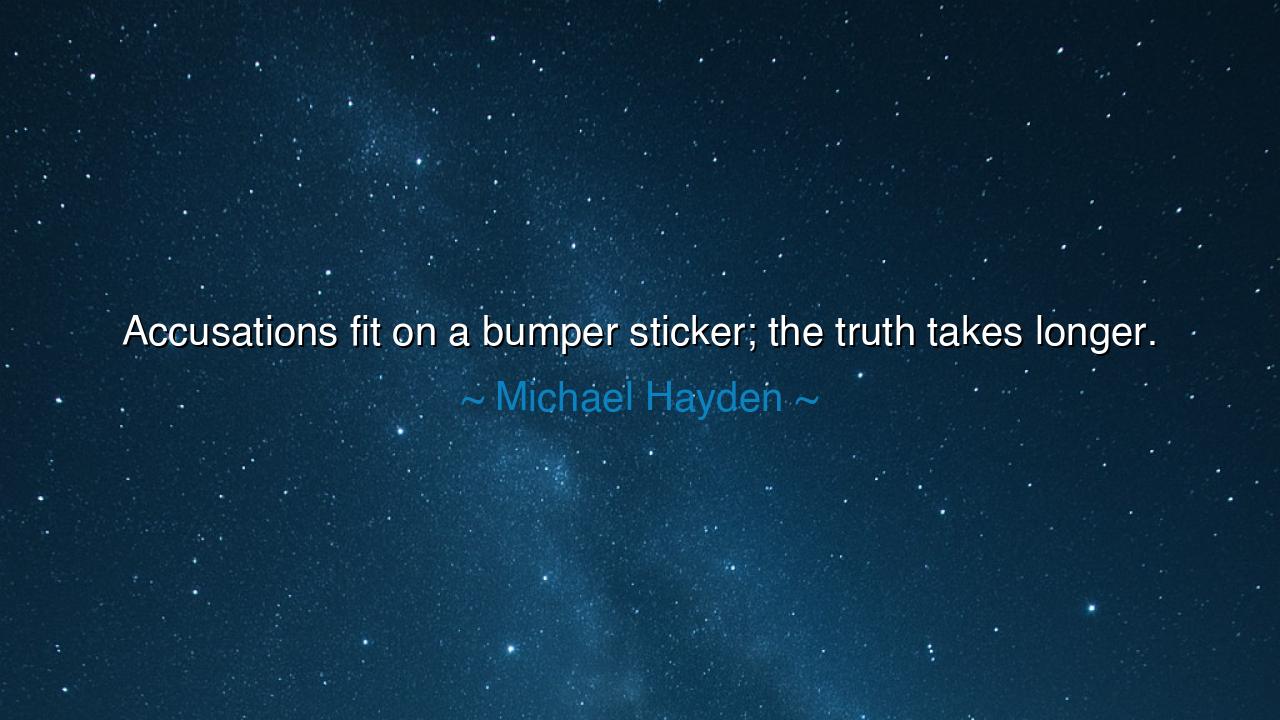
Accusations fit on a bumper sticker; the truth takes longer.






The words of Michael Hayden—“Accusations fit on a bumper sticker; the truth takes longer.”—resound as a warning to every age and every people. They reveal the terrible power of simplicity when wielded in falsehood, and the greater labor of truth, which demands patience, inquiry, and the courage to endure complexity. An accusation is swift, sharp, and easily spread; it needs no roots, no depth, no proof. But truth is a living tree: it grows slowly, it must be tended, and only with time does it bear fruit.
In the courts of the ancients, this was already known. Socrates himself fell victim to the quick sting of accusation. His enemies declared in simple words: “He corrupts the youth, he dishonors the gods.” A sentence fit for a stone tablet, repeated in the market with ease. Yet the truth of his life, his devotion to questioning, his reverence for wisdom, required hours of dialogue, years of thought, and the patience of those willing to listen. The city of Athens chose the bumper sticker over the book, and so condemned a man whose legacy outlived them all.
History gives us countless echoes of this tragedy. During the Salem witch trials, accusations spread like wildfire. A whispered word, a simple charge—“She is a witch!”—was enough to bring fear, trial, and death. The truth—that these women and men were innocent, that hysteria had blinded the town—required time, reason, and calm that the fevered crowd would not grant. Here too, the accusation triumphed in the moment, but history later unmasked its cruelty.
Why is the truth so slow? Because it demands honesty and humility. It asks us to examine causes, to weigh evidence, to consider perspectives. It cannot be spoken in haste, for it is often complex, layered, and resistant to the simplicity of slogans. Accusations, however, flatter the impatient; they offer certainty where none exists, and require no burden of proof. This is why falsehood spreads swiftly, like sparks in a dry forest, while truth must be carried like water, heavy but life-giving.
Yet we are not helpless before this imbalance. Leaders who endure, heroes who are remembered, are those who stand firm for truth, even when it takes longer to be heard. Consider Abraham Lincoln. His critics reduced him to crude accusations—tyrant, destroyer of states, fool. Their words fit neatly into headlines and speeches. But Lincoln’s truth—that the nation must endure, that slavery must end—took years of battle, sacrifice, and steadfast reasoning to reveal. In the end, history honored his long truth over their quick lies.
The lesson for us is this: do not be seduced by the brevity of accusation, nor judge swiftly on words that fit too neatly upon a slogan. Train yourself to wait, to ask, to seek the longer story. Truth does not shout—it whispers, patiently, waiting for the ear that will listen beyond the noise. It is not always easy, but it is always worth the time, for only truth can endure.
Therefore, take these actions: when you hear an accusation, resist the urge to accept it at once. Ask questions, search for evidence, and wait for the fuller picture. When you speak, do not rush to the comfort of simple slander, but commit yourself to the slower work of honesty. And when you live, remember that your integrity may not fit on a bumper sticker, but it will outlast every lie. For as Hayden teaches, accusations may be swift, but truth—though it takes longer—is eternal.






NDKhoi Nguyen Duc
It’s interesting how the quote points out that accusations can be thrown out casually, but truth requires a deeper process. In many ways, the fast pace of life encourages immediate reactions, but truth takes patience. Could it be that in our rush to reach conclusions, we lose sight of the complexity and depth that truth often holds? This seems to suggest we need to be more deliberate and thoughtful in our search for the truth.
SDSang Dao
This quote speaks to the frustration of how accusations can be so instantaneous, while the truth requires nuance and understanding. In today’s society, we are often quick to judge, yet slow to investigate. Why do you think this is? Is it easier to label something as good or bad than to consider all the factors at play? This really challenges us to rethink how we approach truth and judgment in our daily lives.
AT41.Nguyen Anh Thu-8a6
I really resonate with this quote because it’s so true—accusations can be sharp, quick, and direct, but truth is layered and needs time to unfold. It seems like in our fast-paced world, people are quick to point fingers, but don’t always stick around to explore the depth of the situation. Why is it so much easier to blame, and what does that say about how we approach difficult situations?
YYYukio Yugi
Michael Hayden's words seem to show how accusations are often surface-level and simple, yet truth is more complex and requires patience to uncover. It makes me wonder—how often do we settle for the easy version of events, rather than digging deeper for the full picture? Is the truth something we can only appreciate once we've taken the time to understand all the nuances behind it?
TTThuan Thi
This quote really highlights how quickly accusations can be made, often without the full understanding or investigation into the situation. It makes me think about how easy it is to throw blame around, but the truth requires time, effort, and reflection. Why is it that we’re so quick to accuse and so slow to seek out the truth? Do we need to slow down our reactions to really understand the whole story?